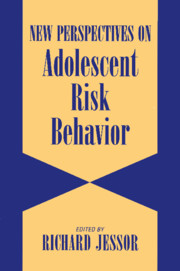Book contents
- Frontmatter
- Contents
- List of contributors
- Preface
- 1 New perspectives on adolescent risk behavior
- Part I A focus on development
- Part II A focus on problem behavior
- Part III A focus on sexual activity
- Part IV A focus on psychopathology
- Part V A focus on social role performance
- 11 Transition to adulthood among high-risk youth
- 12 Disengagement from school and problem behavior in adolescence: A developmental-contextual analysis of the influences of family and part-time work
- 13 New perspectives on adolescent work and the transition to adulthood
- Part VI Overview and integration
- Author index
- Subject index
12 - Disengagement from school and problem behavior in adolescence: A developmental-contextual analysis of the influences of family and part-time work
Published online by Cambridge University Press: 06 July 2010
- Frontmatter
- Contents
- List of contributors
- Preface
- 1 New perspectives on adolescent risk behavior
- Part I A focus on development
- Part II A focus on problem behavior
- Part III A focus on sexual activity
- Part IV A focus on psychopathology
- Part V A focus on social role performance
- 11 Transition to adulthood among high-risk youth
- 12 Disengagement from school and problem behavior in adolescence: A developmental-contextual analysis of the influences of family and part-time work
- 13 New perspectives on adolescent work and the transition to adulthood
- Part VI Overview and integration
- Author index
- Subject index
Summary
The study of adolescent risk behavior has developed through several distinct stages in its relatively brief history. Prior to the mid-1970s, various problem behaviors, such as substance use, delinquent activity, aggression, school failure, depression, and sexual precocity, were studied mainly as isolated phenomena, independent of each other; researchers studied drug use or delinquency, sexual precocity or academic failure, aggression or depression. Few, if any, studies took a developmental approach; more often than not, adolescents who were categorized as having a particular problem (e.g., delinquency) were compared to their peers who did not, with little attention devoted to understanding the processes through which problem behaviors emerged, accelerated, or disappeared over time. And few, if any, researchers attempted to understand adolescent problem behavior within a contextual framework. With the exception of a small number of sociological studies of delinquency, few writers located the causes of problem behavior within the context in which adolescents lived; more typically, problem behaviors were studied in relation to the individual characteristics – personality, intelligence, attitudes – of the troubled adolescents.
The past two decades have ushered in remarkable conceptual advances in the ways in which researchers and theorists think about adolescent problem behavior and risk-taking, however. Three themes, in particular, have emerged that have had a profound influence on research in the area.
- Type
- Chapter
- Information
- New Perspectives on Adolescent Risk Behavior , pp. 391 - 424Publisher: Cambridge University PressPrint publication year: 1998
- 14
- Cited by



